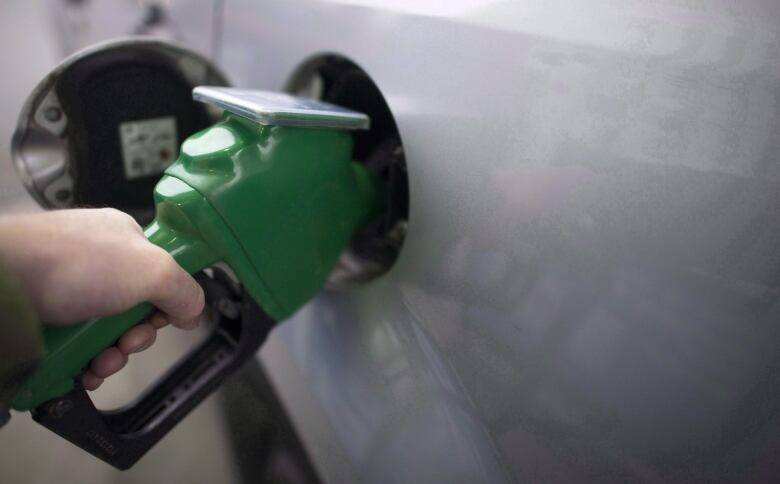In rejecting carbon tax, PCs offer no clear course for reducing emissions
PC Leader Blaine Higgs says if he wins legal fight with federal government he can still meet emissions targets

Progressive Conservative Leader Blaine Higgs may be taking a clear position against carbon taxes, but he's not saying what he'd do instead to keep a lid on carbon dioxide emissions in New Brunswick.
Higgs is promising to join Ontario and Saskatchewan in a constitutional challenge of the federal government's climate plan — a plan that could impose a higher carbon tax on New Brunswick.
Higgs says if he wins that legal fight and kills the tax, he can still meet emissions targets for 2030.
"The plan is in place," Higgs said last week.
"The emission targets are in place in relation to meeting standards for 2030. We will stay on that plan. Introducing a tax doesn't change any of those issues."
A carbon tax is designed to make fossil-fuel consumption more expensive, creating an incentive for consumers to use less. Higgs isn't saying how he'd accomplish the same goal, other than to say he'd use regulations to restrict industrial emissions.
"It's hard to know exactly what he's proposing," said Liberal campaign spokesperson Greg Byrne.
"It seems like policy on the fly."
Saint John clear-air activist Gordon Dalzell noted the province already puts limits on other emissions, such as sulphur dioxide, using certificates issued to large industry under the Clean Air Act.
In fact, Dalzell has advocated for years that the province add carbon dioxide limits to those certificates.
"I don't see why they can't do it," he said.
"There's nothing to stop the minister."
But Dalzell acknowledged that while using those certificates would restrict industrial emissions, they would not affect fossil-fuel consumption by ordinary consumers.
2 targets, 1 of them met
The Gallant government has cited two emissions targets for New Brunswick. One has been met and one has not. The province's legislated goal is 35 per cent below 1990 levels by 2030, or 10.7 megatons.
That objective was agreed to by the Eastern Premiers and New England Governors in 2015, and was written into law by Gallant's climate legislation.
The Paris climate agreement sets out a less stringent goal: a reduction of greenhouse gases to 30 per cent below 2005 levels.
In New Brunswick, that translates to an easier target of 14.3 megatons. The province emitted 14.1 megatons in 2015, which is why the PCs say no carbon tax is needed.
But Higgs also support new industrial development that would increase emissions, such as the Sisson mine north of Fredericton and localized fracking of shale gas.
He said those developments wouldn't blow past the 2030 target.
"We will ensure that those plants, those operations, stay within the guidelines. In both of those cases emissions are pretty low so that wouldn't be a problem.
"We will ensure, under regulation, that new industries, new development, continue to meet the standard we've set for 2030."
Carbon price provides more flexibility
Nic Rivers, a University of Ottawa professor who studies energy and climate economics, says most economists agree putting a price on emissions is a better way to reduce them than simply ordering industry to cut them.
With regulations, "no matter how much it costs to reduce emissions, you're making them do that," he said.
"It's this lack of flexibility in most regulations that make them more expensive."
A carbon price "lets businesses make business decisions about whether it's cost-effective to reduce their emissions" and lets them choose the best way to get there, he said.
For large industry, Gallant's plan adopts the federal levy on emissions. Large industry that emit below a certain level will earn credits they can sell to other plants that exceed the cap.
The Liberal plan for consumers diverts a share of the existing 15.5-cent-per-litre gas tax into a climate fund and calls it a carbon price, with no net increase for drivers.
The government is arguing that with New Brunswick emissions already below Paris targets, a higher tax isn't needed.

Liberals accused of hypocrisy
When he was asked last Friday for his emissions-reduction plan, Higgs at first accused the Liberals of hypocrisy for talking about lowering them while at the same time embracing large, carbon-emitting projects.
"I wouldn't be buying a smelter up north, let's put it that way. I wouldn't be putting government money into one of the largest emitting plants possible," he said, referring to the Gallant government's promotion of a proposed iron refinery in Belledune.
"You wouldn't talk out of both sides of your mouth."

The government has already given the company, Maritime Iron, $625,000 for "pre-feasibility" studies of the project. The province has not bought the project.
Higgs also slammed Prime Minister Justin Trudeau for "saying on the one hand 'I'm going to keep emissions down but I'm going to pay $8.5 billion on a pipeline that I can't get to market.'"
That's a reference to the proposed expansion of the Trans Mountain Pipeline from Alberta to British Columbia, which the federal government took over this summer.

Ruling this year on Gallant plan
The federal government must rule this fall on whether Gallant's plan meets its requirements for an additional price on carbon dioxide for both consumers and industry.
If it doesn't, Ottawa could impose its own carbon price on the province on Jan. 1 that would lead to a higher price at the pumps.
Gallant's government has argued a higher pump tax would be unfair to New Brunswick consumers because residents in most parts of the province don't have other options such as public transit.


